- About Archives
- About SAA
- Careers
- Education
- Publications
- Advocacy
- Membership
***Voting is NOW open! Members will receive an email from SAA with voting instructions. Voting is open until Friday, August 25th.****
 Ricardo L. Punzalan
Ricardo L. PunzalanAssistant Professor of Archives & Digital Curation
College of Information Studies
University of Maryland, College Park
Bio: Ricardo L. Punzalan is assistant professor of archives and digital curation at the College of Information Studies, affiliate faculty in the Department of Anthropology, and co-director of Museum Scholarship and Material Culture program at the University of Maryland, College Park. In 2016, he received an early-career grant from the U.S. Institute of Museum and Library Services (IMLS) to study and develop strategies to assess the impact of access to digitized ethnographic archives for academic and Indigenous community users. He also examines ‘virtual reunification’ as a strategy to provide integrated access to dispersed ethnographic archival images online. He leads a team of postdoctoral scholars and masters’ fellows to enhance agricultural data curation efforts at the U.S. National Agricultural Library. He holds a Ph.D. in Information as well as graduate certificates in Science, Technology, and Society (STS) and Museum Studies from the University of Michigan. He previously taught on the faculty of the University of the Philippines School of Library and Information Studies. His articles have been published in leading LIS and archives journals, including the Library Quarterly, American Archivist, Archivaria, and Archival Science. In 2012, he received the Hugh A. Taylor Prize from the Association of Canadian Archivists for his co-authored article in Archivaria on users and uses of digitized photographic archives.
Statement: As current Chair of the Section, I would like to serve another term. I decided to run primarily because I see that the task ahead for the Section remains large, but I am optimistic of what this group can achieve in service of Native American and Indigenous communities, the archival profession, and the rest of society. I aim to reinvigorate our membership through regular call-in meetings and engage current steering committe and past leadership in developing and implementing fresh and exciting programs and projects. I wish to continue our discussion around the Protocols for Native American Archival Materials (PNAAM), which remains one of the most important set of guiding principles for our Section; I propose to lead a group of interested volunteers to compile a set of case studies that center on PNAAM adoption and implementation.
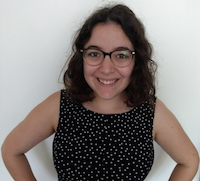 Stephanie Bredbenner
Stephanie BredbennerProcessing Archivist for Western Americana
Beinecke Rare Book and Manuscript Library
Yale University
Bio: Stephanie Bredbenner is the processing archivist for Western Americana at the Beinecke Rare Book and Manuscript Library at Yale University, where she describes collections relating to indigenous peoples in the western United States. Before coming to Yale, she was the project archivist at the San Diego Museum of Man, an anthropology museum with artifacts and archives from indigenous peoples in California and Mexico. While project archivist, she processed collections and implemented policies and procedures for sensitive indigenous materials, particularly photographs. Stephanie has a bachelor’s degree in history and English from Bryn Mawr College and a master’s degree in archives and records management from the University of Liverpool (UK). Her honors dissertation at the University of Liverpool focused on description of indigenous language archives in the United States and New Zealand.
Statement: I would be honored to serve on the steering committee of NAAS because of my longstanding interest in indigenous archives, particularly description of indigenous archives and indigenous language archives. As a steering committee member, one of my primary goals would be the discussion, dissemination, and promotion of the Protocols for Native American Archival Materials as a resource to archivists and tribes alike. I believe publishing case studies, sample finding aids, and guidelines tailored to different institutional needs would be helpful resources for NAAS to cultivate. I would also be interested in promoting the discovery and description of indigenous language archives, including compiling a list of tribal authorities and indigenous language experts who can provide insight into describing indigenous language archival materials. Finally, I am motived by my international training and interest in comparative and international contexts to broaden the scope of the section’s work to include indigenous archives from other countries. From my own experience in southern California, I know that some tribes, cultures, and languages span across national borders. Indigenous archives in other countries can also serve as a mirror and counterpoint to our own work in ways that are thought-provoking and fascinating.
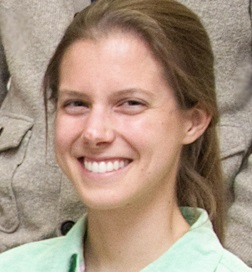 Rose Buchanan
Rose BuchananArchives Technician
National Archives and Records Administration (NARA)
Bio: Rose Buchanan is an Archives Technician at the National Archives and Records Administration (NARA) in Washington, DC. As a part of NARA’s Research Services Division, Rose provides on- and off-site reference to researchers interested in NARA’s holdings, focusing in particular on records of the Bureau of Indian Affairs. She also assists researchers in digitizing NARA’s records in the Innovation Hub. As a NARA intern in 2014, Rose collaborated with a national team of NARA archivists on the agency’s award-winning “American Indian Records” webpages. Rose earned her Master's in Public History from North Carolina State University and her Master’s in Library Science from the University of North Carolina at Chapel Hill. Her academic research focuses on the information-seeking behaviors of archival users interested in Native American collections, and the role that indigenous archives play in challenging inaccurate and stereotypical views of indigenous peoples.
Statement: Working at NARA, the repository of the historical records of the federal government, I am acutely aware of the role that non-indigenous archives have played in privileging certain historical narratives over others. At the same time, I have experienced firsthand the challenges that government archivists face in balancing appropriate and respectful stewardship of materials about indigenous communities with their institutional commitment to public transparency and open access. I have appreciated the resources that NAAS has provided to date to help archivists navigate the complex issues of cultural sensitivity and access. However, if given the opportunity to join the NAAS steering committee, I hope to encourage more conversation about the ways in which government archivists, specifically, can navigate these challenges, given the unique constraints of their positions. I would especially like to see the development and publication of more case studies of government archives’ implementation of the Protocols for Native American Archival Materials, which could be used as guidance for other professionals in the field. Given the vast amount of materials that government archives house related to indigenous communities, I also hope to raise awareness of the unique opportunities that government archivists have to help uncover marginalized voices in their collections.
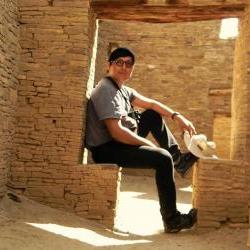 Stephen R. Curley
Stephen R. CurleyArchivist
Mashpee Wampanoag Tribe (Mashpee, Mass.)
Bio: Stephen R. Curley, MLS is a member of the Navajo Nation and is the Archivist for the Mashpee Wampanoag Tribe of Cape Cod. As the first Archivist for this tribal nation, Stephen is working to establish a viable archival institution dedicated to preserving the histories and material culture of its people. Stephen is committed to being of service to American Indian communities with respect to their archives and museums in order to bolster and develop those institutions and systems associated with them. He finds it imperative for tribes, as nations, to bolster such information institutions for themselves so they can effectively continue to cultivate not only a sense of cultural identity, but also a national identity. As a tribal-centric scholar, Stephen finds that information infrastructures are still quite nascent with respect to tribal institutions. Since tribal information institutions (i.e. archives, libraries, and museums) are developing yet, it is an exciting time to implement their strengths and to bolster the areas considered lacking in creative and new directions. Stephen is actively working towards contributing resolve to these fundamental questions that tribes will be answering.
Statement: My vision for NAAS is for it to be an easily approachable and accessible resource to current and future archivists and relevant disciplines. Moreover, In order for NAAS to be effective it must reach further outward to other disciplines so that archivy and its methodologies are understood and valued therein by American Indian people. I propose that NAAS develop outreach initiatives to tribal governments and to other academic institutes such as the Native Nations Institute regarding the importance of the archives and its applications in tribal settings. Indian country is vast and diverse; the NAAS must network with such entities whom are established and trusted in tribal communities and governments alike in order to facilitate meaningful action.
 Caitlin Haynes
Caitlin HaynesReference Archivist
National Anthropological Archives (NAA)
Smithsonian Institution
Bio: Caitlin Haynes is the Reference Archivist for the Smithsonian Institution’s National Anthropological Archives (NAA), a position she has held since 2015. In this position, she is responsible for all managing all aspects of remote and onsite reference, outreach, and access, including facilitating the use of NAA collections by Native community members: the NAA’s second largest user group. Currently, she is leading a project in collaboration with the Department of Anthropology’s Curator of Linguistics and Native communities in developing culture-specific subject guides for Native materials held in the NAA. Caitlin previously served as a research associate for the Papers of Abraham Lincoln. She holds a Master’s of Arts in United States History and a Master’s of Library and Information Science from the University of Maryland, College Park, along with a Bachelor of Arts in History and Anthropology (double major) from Emory University. During Caitlin’s graduate career, she served on the Instruction and Outreach team at the University of Maryland’s Special Collections and University Archives, led undergraduate history courses, and held a graduate assistantship for the history department’s Center for Global Migration Studies. Caitlin has been a member of SAA and NAAS since 2015, and is a member of the Mid-Atlantic Regional Archives Conference (MARAC), the Southern Historical Association (SHA), the Association of Tribal Archives Libraries and Museums (ATALM), and the National Genealogical Society (NGS).
Statement: As one of the nation’s largest repositories of Indigenous archival materials, the NAA adheres to the Protocols for Native American Archival Materials, and works to ensure that our materials are described, used, and shared in ways that incorporate Native voices and input through collaboration and communication. As the reference archivist, I am often at the forefront of discussions with Native communities as they navigate our holdings and assist us in improving records’ information and use. NAAS has long been an important forum for collaborative discussions on how best to advance and expand this kind of work, and I welcome the opportunity to take a more active role. I wish to assist in collecting and publishing case studies for the Protocols—including some of our own examples in the NAA of opportunities and challenges. I also hope to facilitate the creation of more concrete guidelines for collaboration between archival repositories and Native communities. Developing this kind of resource at the NAAS level in collaboration with other federal repositories, Native researchers, and Tribal Historic Preservation Officers (among other individuals and organizations), I anticipate will encourage wider adoption of these best practices and facilitate further discussions between cultural heritage professionals and Indigenous communities.
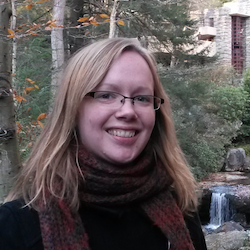
Processing Archivist
National Anthropological Archives
Smithsonian Institution
Bio: Katherine Madison is the Processing Archivist at the Smithsonian Institution's National Anthropological Archives. In her position, she processes the ethnographic and personal papers of anthropologists, encountering issues of respectful, accurate, and discoverable arrangement and description on a near-daily basis. She earned her MLIS with a specialization in archives and information sciences from the University of Pittsburgh's School of Information Sciences. She also holds an MA in early American history from the College of William & Mary. Her interests lie in digital curation, respectful descriptive practices, and representations of archives and records in popular culture. In 2016, Kate was awarded the F. Gerald Ham and Elsie Ham Scholarship for Graduate Studies for her article, "The Archival Captive Revisited: Native American Archival Materials and Self-Determination in the Archive," which she is now preparing for publication. She has previously published "Who Lives, Who Dies, Who Tells Your Story: The Use and Representation of Records in Hamilton: An American Musical" in The American Archivist (Spring/Summer 2017). Kate previously served as a steering committee member for the Students and New Professionals Section (SNAP) from 2016-2017 and as the President of the Society of American Archivists Student Chapter at the University of Pittsburgh from 2015-2016.
Statement: I view the Native American Archives Section in two ways. First, I see it as a forum that provides guidance, support, and discussion for archivists facing the unique issues relating to indigenous materials and tribal archives. Second, I see it as a locus of information for the archival profession seeking to understand the basic archival tenets of representation and access, broadened and complicated by cultural sensitivities. I became interested in Native American archival materials while in graduate school, where I embarked on research to understand the professional discourse surrounding the ethics of respectful access and description. Now as the Processing Archivist at the National Anthropological Archives, one of the nation's largest repositories relating to indigenous cultures, those issues are central to my professional practice. Through my involvement in NAAS, I hope to continue the Section's work as an advocacy leader relating to the "Protocols for Native American Archival Materials." I also hope to increase awareness and outreach among SAA membership about the challenges of archiving culturally sensitive materials, and of the values of ethical access and description. Having previously served on the steering committee for SNAP, where the goal was to provide knowledge and support for new archival professionals, I hope to bring the same energy of support, discovery, and development to NAAS.
Assistant Curator
SUNY Upstate Medical University
Historical Collections
Bio: Nicole Topich is the assistant curator of SUNY Upstate's Archives and Special Collections in Syracuse, New York. Previously, she worked for four years as the archivist for the Performance of Politics project at Harvard University, where she coordinated the Digital Archives of Massachusetts Native American, Anti-Slavery, and Anti-Segregation Petitions with the Massachusetts state archives. This ongoing project is collaborating with indigenous communities represented in the archives to catalog and digitize thousands of government records from and about people of color that were sent to the state legislatures. In addition, she has worked at a variety of archives and libraries over the past ten years, including the National Archives and Records Administration in College Park, the Friends Historical Library, the Clinton Presidential Library, the Library of Congress, and the University of Pennsylvania.
Statement: As shown by the heavily attended sessions on indigenous archives at this year's SAA meeting, NAAS can serve as an important resource and discussion forum. These conversations need to continue outside of the annual meetings, which only some archivists can attend and which do not provide enough time for every issue to be discussed. In addition, many archivists who should be learning about indigenous archives issues were not at or aware of these sessions, which I see as detrimental to our profession. I am interested in serving on the steering committee to expand communications between NAAS members and the wider SAA communities. I propose that NAAS provide more outlets for communication, resources, and networking opportunities, such as regional meetups or meetups at related conferences. Also, because non-archivists consult the NAAS website for questions about indigenous archives, I would like to place resources on it about people, organizations, and websites that can be consulted and a list of organizations dealing with similar issues (such as ATALM). Lastly, I think it is particularly important for NAAS to work with library science programs since every archivist in training should be aware of indigenous archives issues and the protocols.
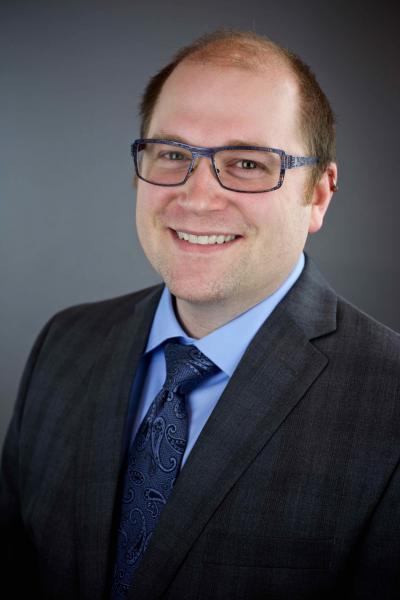
Community Collections Archivist
Virginia Tech
Bio: Anthony Wright de Hernandez is the Community Collections Archivist and Resident Librarian at Virginia Tech in Blacksburg, Virginia where he works to improve representation in the archival record for traditionally underrepresented groups. He earned his MLIS in 2013 from the University of Washington’s iSchool and has a BA in Community Studies from the University of Massachusetts, Boston. Anthony is currently Director of Communications and Outreach for the Virginia Library Association’s Diversity and Inclusion Forum, and is serving on the SAA Finance Committee, and the ACRL Residency Interest Group’s Web Committee. He previously served of the ALA GLBT Round Table Web Committee. He is a member of the Mid-Atlantic Regional Archives Conference (MARAC), the Society of American Archivists (SAA), the American Library Association (ALA), and the Association of College and Research Libraries (ACRL).
Statement: Virginia Tech has a turbulent history with the Indigenous Nations in Virginia, as so many institutions have with the Nations in their own areas. During my time at Virginia Tech, I have worked with our new American Indian and Indigenous Cultural Center to support their efforts at repairing relations with Virginia’s Indigenous population. While our Special Collections does not house any collections about these communities, I see the role of the archives as more than just accessioning material. We are a vital part of the work of building relationships with traditionally marginalized communities and forming a mutually beneficial partnership. From this perspective, I see NAAR as a place to learn from the efforts of others who have engaged in the work of repairing damaged relationships with the Indigenous community. NAAR members have the experience and insight to lead our profession in this work. My goal for NAAR is the creation of resources in the form of case studies and guides that can teach others how to approach this work respectfully and productively.